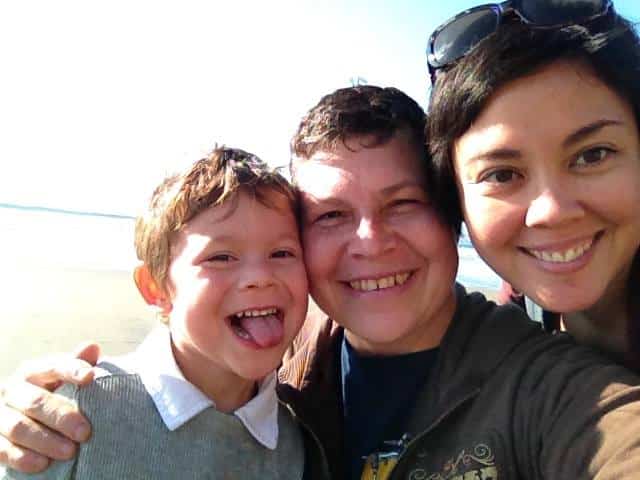Dana – Paid Leave Shouldn’t Depend On Where You Live

Dana Ginn Paredes first met Lillian Ortiz during a union drive in 1999. Lillian was a server at a Japanese restaurant that Dana was helping to unionize. They didn’t start dating until later that year, but Dana says they soon knew they would be life partners. At first they didn’t think about establishing a legal relationship. But when the California Supreme Court ruled in favor of marriage equality in 2008, the two decided, “We should do this. The more people get married during this time, the harder it will be to turn it back.” They had a simple ceremony at their house with a few friends. And they started talking about having a baby.
Prop 8 passed in November 2008 and left the legality of their marriage in doubt, but not their determination to have a child. Lillian eventually became pregnant and their son, Emiliano Paredes-Ortiz, was born in June of 2010.
Fortunately, Dana worked for a non-profit called Forward Together dedicated to social change. The organization made sure staff knew how to access the state paid leave fund, but also ensured they could accrue other paid time and take that as well. Dana asked for and got three months leave, even though another director was pregnant and the group’s leader was about to go on sabbatical.
Dana and Lillian, who were both in their late 30s, felt like they’d been on “a long journey of trial and error. We wanted to be present for every second of those first months. Whether people are queer or single or a couple or heterosexual, everyone says the same thing, it goes by so quickly. There’s so much to take in and enjoy together. What a relief to know we didn’t have to worry about making ends meet during those first months. It still feels like the most wonderful time of our lives.”
Dana was born in Tucson. Like most states, Arizona has no paid family leave program. Had she still lived there, Dana said, she can’t imagine how she would have managed. When the possibility of paid time doesn’t exist in a state, there is a greater chance employers won’t provide that leave either. Dana describes her family as “some of hardest working people I know, and they deserve paid time to be with their families. It shouldn’t matter where we live.”
In addition to bonding with the baby, Dana’s leave became crucial for caring for her partner. Lillian had a long labor and ended up having to have a c-section. After a while the incision became seriously infected. Treatment required manual cleaning every two hours for a couple of weeks. “If I hadn’t had the time to do that, I don’t know what we would have done,” Dana said. “Lillian couldn’t have done it herself. There are no painkillers for this and it’s very painful.”
Dana expressed her sorrow for people who don’t have access to this kind of leave. “Our assumption was that if we invest in that relationship now, that foundation will help him when he grows to be an adult. He’ll have a deeper root in knowing he has family he can call on for help, a deeper root in how to care for others because he’s been so well cared for.” The couple made a decision that Lillian, who is bilingual, would be a full-time parent for the first few years.